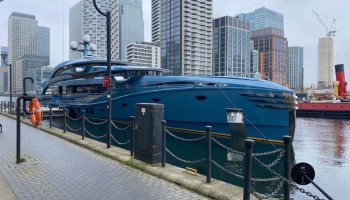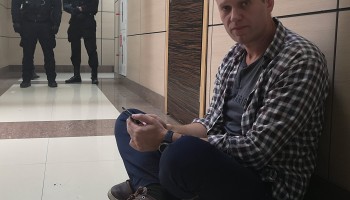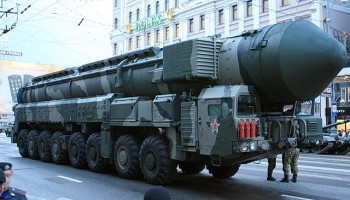Converting civilian industries to military production in the shortest possible time is a long-standing tradition in Russia. In the city of Čeljabinsk, this practice has been revived in the image of arms manufacturer Stankomash and its Italian investors, which has made this four kilometer area the new hub for the Russian war machine.
As the war against Ukraine continues, the Kremlin has reached the milestone of converting 850 civilian enterprises towards military production. A large part of this is thanks to its Italian investors, namely Cividale Spa, which - according to its financial statements - in 2012 contributed €4.5 million ($4.6 million) for a 30% stake of the Russian company BVK, which now owns the local smelter that generates round-the-clock production for Stankomash.
Due to its association with the Russian arms industry, the partly Cividale-controlled company was sanctioned by the U.S. State Department in June last year.
Cividale Spa told OCCRP's Italian member center IRPI that it was “uninvolved in the ordinary and extraordinary management” of BVK by “not taking part in the company's administration” and that it “merely took note” of the U.S. sanctions.
During Russia’s defence against the Nazi offences in WWII, 60 factories were transferred to Čeljabinsk from occupied territories and the entire Stankomash plant was converted to wartime production. By the end of the Cold War, with no enemies left to fight, Čeljabinsk had become a shadow of its former self and was on the brink of bankruptcy.
But then in 2013, one year before Russia’s invasion of Crimea, BVK was born and reignited the local foundry to meet Stankomash’s production orders. The area has been operating at full capacity since 2018.
Russian President Vladimir Putin himself stressed the need “to increase production for the machine tool industry in order to increase Russia's defense industrial capacity.”
Cividale facilitated this with its initial $4.6 million investment, corresponding to 30 percent of the joint venture's share capital. In its 2011 report to shareholders, Cividale described the deal as “an important international opening” to create the “first quality steel foundry in Russia.”
By 2018, when the renovations to Čeljabinsk’s industrial capabilities were complete, Putin welcomed then-Italian Prime Minister Giuseppe Conte to the Kremlin and declared that “Italian cooperation has helped us create an entire industrial hub that includes important high-tech enterprises.”
“We will pay any price for victory,” is the verse of a famous Russian song from the 1970s. It was the anthem of Soviet airborne troops and, according to military consultant for the Lithuanian Defense Ministry Davis Petraitis, sums up the approach on which the Russian military apparatus has been based since the end of World War II.
“The war economy is at the heart of the state economy, which means that the economy itself must provide everything necessary for war,” Petraitis writes in a 2024 report of Russia's war economy.
In contrast, the approach followed by most Western countries since the 20th century has been diametrically opposed: it assumes that a war, if it becomes too costly, must be stopped to avoid bankruptcy.
After 25 years of Putin's rule, today’s Russian economy “is a war economy,” says Elio Calcagno, researcher in the European military for the Institute of International Affairs. This follows Putin’s goal of converting 50 percent of Russia’s entire production capacity for the military by 2030. Official estimates place the current average at 30 percent.
Between 2014 and 2023, the Cividale Group reported total revenues from Russia of about 93 million euros ($95.8 million) on its balance sheet.
And this relationship has also gone the other way. Customs data show that, in 2022, Russia imported Cividale-branded goods worth 10 million euros ($10.3 million). These include propeller blades for icebreaker ships, parts for steam turbines and pumps for oil and gas, and large-caliber turning and milling equipment.
Of Cividale’s 67 shipments to Russia in 2023 alone, at least five would involve goods with EU-sanctioned commodity codes. In the absence of the contracts, however, it is not possible to determine whether this is a violation of the sanctions.
When reached for comment, Cividale stressed that it had “scrupulously complied with the provisions of the sanctions packages that have been gradually approved, obtaining, where required, the necessary authorizations to export to Russia.” The Friuli-based company added that it had completed the delivery of orders closed before the sanctions came into force and that “the customs codes indicated [...] were not subject to export to Russia.”
Asked about a possible re-evaluation of its involvement in Russia in light of the U.S. sanctions, the company said that it is implementing a demerger of BVK, to place the Russian company “outside the perimeter of the consolidated financial statements of Cividale Spa.”






